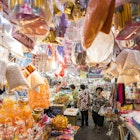

A view of Ko Kret from the Chao Phraya River. Image by Austin Bush
Bangkok’s easiest green getaway, Ko Kret is an artificial ‘island’, the result of a canal being dug nearly 300 years ago to shorten an oxbow bend in the Chao Phraya River. The island is also one of Thailand’s oldest settlements of Mon people, who were a dominant tribe of central Thailand between the 6th and 10th centuries AD. Today, Ko Kret is known for its rural atmosphere, its distinctive pottery and its busy weekend market.

What to see
The real fun of Ko Kret is cruising through the tiny hamlets, enjoying the soothing rural views and stopping for a cool drink as the mood strikes. However, there are a few tourist attractions on the island. Arguably the biggest sight is Wat Poramai Yikawat. Located across from Ko Kret’s main pier, this Buddhist temple has a Mon-style marble Buddha statue and a museum with religious objects and exhibits on local pottery. But the temple’s most famous landmark is undoubtedly the 200-year-old leaning stupa that juts out from the island’s northeastern corner.
From Wat Poramai Yikawat, go in either direction to find both abandoned kilns and working pottery centres on the island’s east and north coasts. This is because Ko Kret is known for its hand-thrown terracotta pots, sold at markets throughout Bangkok; order an iced coffee from just about any vendor on the island and you’ll get a small one as a souvenir.

What and where to eat
Virtually the first thing one encounters after disembarking from the boat, and probably the common dish on Ko Kret, is a snack of Mon origin known as tort man nor galah. Tort man usually refers to a dish of deep-fried patties of ground fish, however this particular version consists of various fresh herbs, colorful flowers, mushrooms and nor galah, an aquatic vegetable, battered, deep-fried until crispy, and served with a sweet and sour sauce.
Other Mon dishes sold on Koh Kret include kanom jeen, fermented rice noodles eaten with a variety of different curries, and a rice dish known as kow chaa. The latter is an improbable but delicious combination of camphor-scented rice in chilled water with savory titbits, and is particularly popular during the Thai summer as it is considered to have cooling properties.
Other than Mon food, Ko Kret is also known for its kanom, sweets, and korng wahng, savory/sweet snacks, and Thai visitors to the island tend to leave clutching bagfuls of both. This wealth of sweet food is due to the fact that sugar palms grow very well in the fertile soil of the riverbank, thus supplying the people in the area with ample raw materials. The korng wahng you’re likely to encounter on Ko Kret include miang kam, wild tea leaves topped with a do-it-yourself mixture of fresh herbs and a thick, savory/sweet sauce, and pan sip, tiny deep-fried 'turnovers' filled with a mixture of shredded fish, ground peanuts and black pepper. Another delicious snack one rarely sees nowadays is gai sarong, minced chicken wrapped in egg noodles and deep fried, resulting in crispy golden balls.
The northern coast of Ko Kret is home to a row of open-air restaurants, many serving Mon-style dishes. Pa Ka Lung, an open-air food court with an English-language menu and sign, serves kaw chaa, kanom jeen and Thai dishes.

How to get around
At Ko Kret’s pier you will find a few simple stores and a fleet of motorcycle taxis – many of which are driven by women, something of an oddity in Bangkok. While most motorcycle taxi drivers in Bangkok hail from rural northern Thailand, the ladies who drive the motorcycles on Ko Kret are almost all locals. You can hire a motorcycle taxi for 50B per hour or, if you can bear cycling in the heat, a basic bicycle will cost 40B per day. It takes around 45 minutes to make a full circuit of the island by motorcycle, and the 6km road is a narrow concrete strip less than two metres across, shared between motorbikes, bicycles, pedestrians, livestock and hoards of giggling children. Alternatively, if you’re there on a weekend, it’s possible to charter a boat for up to 10 people for 500B; the typical island tour stops at a batik workshop, a sweets factory and on weekends a floating market.
When to go
Ko Kret can be horribly crowded on weekends; head out here on a weekday instead. There are fewer eating and shopping options, but you’ll have the place to yourself.
How to get there
Ko Kret is in Nonthaburi, about 12km north of central Bangkok. To get there, take bus 33 from Sanam Luang, bus 166 from the Victory Monument or a taxi to Pak Kret, before boarding the cross-river ferry (2B, 5am to 9pm) that leaves from Wat Sanam Neua. Alternatively, the Chao Phraya Express Boat’s ‘green flag’ express runs from to Pak Kret to Saphan Taksin (Tha Sathon or Central Pier) on weekdays every 20 minutes from 6.10am to 8.10am, and in the opposite direction every 20 minutes from 4.05pm to 6.05pm (32B).
This article was first published by Chris Rothorn in April 2012, and updated by Austin Bush in November 2014.
Explore related stories










